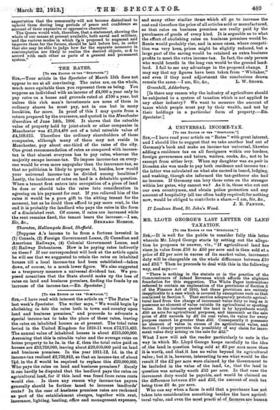THE RATES.
[To TVA EDITOR 07 Tea "SPECTATOR."] SIR,—Your article in the Spectator of March 15th does not appear to me at all convincing. The rates are, on the whole, much more equitable than you represent them as being. You "suppose an individual with an income of £4,000 a year only to pay rates on a house and grounds rated at £100 a year, but unless this rich man's investments are none of them in ordinary shares he must pay, not in • one but in many localities, far more. In proof of this I may quote from a return prepared by the overseers, and quoted in the Manchester Guardian of June 14th, 1906. It shows that the rateable value of property held by joint-stock or other companies in Manchester was £1,314,499 out of a total rateable value of 24,108.615. Therefore the ordinary shareholders of these companies, although many of them may not reside in Manchester, pay about one-third of the rates of the city. One great recommendation of rates as compared with income- tax is that almost everyone has to pay rates, whereas the majority escape income-tax. To impose income-tax on every- one would be even more unpopular than the insurance-tax, so that no politician is likely to propose it, besides, how would your universal income-tax be divided among localities P Lastly, the incidence of rates on land is a debatable question. When a tenant first enters into occupation of a piece of land he does or should take the rates into consideration in agreeing on his payment for rent. If you relieved him of the rates it would be a pure gift to the sitting tenant for the moment, but as he Could then afford to pay more rent, in the end it is probably the landlord who pays the rates in the form of a diminished rent. Of course, if rates are increased while the rent remains fixed, the tenant bears the increase.—I am, [Suppose A.'s income to be from a fortune invested in (1) Consols, (2) Foreign Government Loans, (3) Canadian and American Railways, (4) Colonial Government Loans, and -(5) Railway Debentures. How is he paying rates indirectly on these P If our correspondent will look at the article again he will see that we suggested to retain the rates on inhabited houses till a local income-tax had been established—taken down, of course, to a much lower figure. We also suggested as a temporary measure a universal dividend tax. We pro- posed meantime that the State should make up the loss of rates on land and business premises, finding the funds by an increase of the income-tax.—En. Spectator.]














































 Previous page
Previous page